I bought my first domain name back in 2004, and I’ll never forget how confused I was by all the options and pricing plans. Since then, I’ve registered hundreds of domains for my own projects and helped thousands of website owners choose the right domain registrar through WPBeginner.
Over the years, I’ve learned that choosing the wrong domain registrar can lead to frustrating issues like hidden renewal fees, poor customer support, and complicated domain management. That’s why it’s so important to get it right from the start.
For this guide, I spent weeks testing and comparing over 30 domain registrars to find the most reliable and cost-effective options. I looked at everything from pricing and features to security and ease of use, so you can choose the best registrar for your needs.
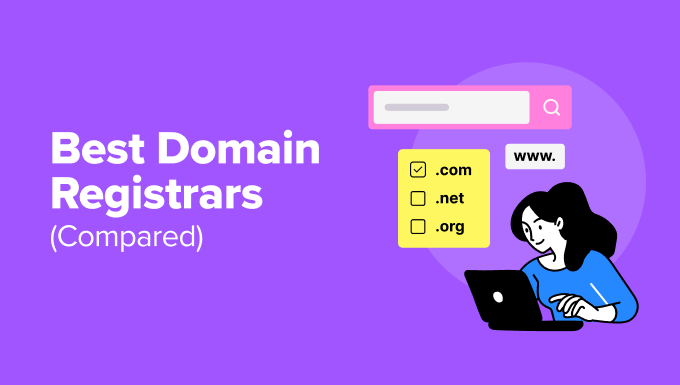
Overview: The Best Domain Name Registrars
If you prefer not to read my whole review, then you can check out my quick domain registrar comparison here:
| Registrar | Best For | Price | Key Features | |
| 🥇 | Domain .com | Unique & premium domains | $7.45 /yr | Quick search, bulk registration, easy transfers, robust DNS management |
| 🥈 | Bluehost | Affordable hosting + domain | $1.99 /mo | Free domain for 1st year, pre-installed WordPress, 24/7 support, beginner-friendly |
| 🥉 | Hostinger | Hosting + domain + privacy | $2.69 /mo | Free domain privacy protection, easy DNS management, website builder, fast hosting |
| 4 | Network Solutions | Wide range of services | $7.49 /yr | One-stop shop for web services, various TLDs, website builder |
| 5 | GoDaddy | Domain brokerage | $11.99 /yr | Domain brokerage, long-term registration (up to 10 years), large domain selection |
| 6 | Name cheap | Domain auctions | $6.49 /yr | Domain auction tool, powerful domain search, free WHOIS privacy |
| 7 | Dream host | Free privacy protection | $2.59 /mo | Free domain privacy with hosting, 400+ TLDs, shared and managed WP hosting |
| 8 | HostGator | Easy domain registration | $1.99 /mo | Beginner-friendly interface, website builder, domain privacy |
How I Choose the Right Domain Registrar for My Websites
Ever since I started building websites over a decade ago, I’ve noticed that not all domain registrars are the same.
For example, not all domain registrars have the license to sell all domain name extensions. Some domain registrars can only sell domain names with country-specific extensions (like .io, .in, or .ly).
Each domain registrar may also give you different services along with the domain name registration. Some registrars may offer cheap domains as their promotional deals, while others may give free add-ons to attract customers.
Based on my extensive experience, here are the key factors I consider when selecting a domain registrar, along with some important red flags to watch out for:
- Pricing and registration period: Check both initial and renewal prices. I’ve found that some offer low first-year rates but higher renewal fees.
- Domain transfers: Make sure the registrar allows easy domain transfers without extra fees. Some may impose unreasonable restrictions on moving your domain.
- Expiration policies: I often look for registrars offering grace periods after expiration just in case I forget to renew my domain name.
- Add-on services: Consider what additional services they provide, such as domain privacy or WordPress hosting. I’ve found that some may even offer privacy protection for free.
- User experience: My personal rule of thumb is to avoid registrars with complicated interfaces that make domain management difficult.
- Hidden fees: Be wary of unexpected charges or pre-checked add-ons during checkout.
- Customer support: Quality support is important, especially for beginners. There were many times my website experienced domain-related errors, and having access to responsive customer support really helped me out.
- Reputation and reliability: Always research the registrar’s track record for security and uptime. I do this to make sure my domain name remains available at all times.
Why Trust My Recommendations?
With over a decade of experience in building WordPress sites and working with different domain registrars, I’ve developed a careful process for testing and reviewing tools for WPBeginner.
My approach involves hands-on testing on real websites, comparing the costs versus value of these tools, and reading community feedback to gather more perspectives on each platform. You can read more in the complete WPBeginner editorial process.
That being said, let’s look at my picks for the best domain name registrars and how they compare against each other.
1. Domain.com
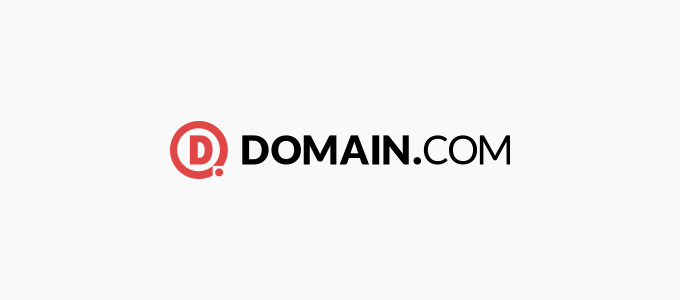
Domain.com is my go-to registrar for most of my projects, including WPBeginner. It’s a solid choice for anyone looking for a unique or premium domain extension. I’ve used them to register everything from standard .com domains to more niche extensions like .io and .co.
✅ Pros of Domain.com:
- They offer a huge variety of TLDs and ccTLDs, so you’re likely to find the perfect extension for your niche. You can even register a .photography domain for your personal photography blog!
- Their domain search tool is incredibly fast and makes it easy to find available domains. It even suggests alternative options if your first choice is taken.
- The interface is clean and intuitive, even for beginners. I’ve never had any trouble managing my domains, renewing registrations, or updating DNS settings.
❌ Cons of Domain.com:
- While most features are reasonably priced, domain privacy is an add-on cost. This is a minor annoyance, but it’s something to keep in mind.
Why I chose Domain.com: I’ve been using Domain.com for years, and they’ve always been reliable and easy to work with. Their extensive domain selection and simple interface make them a great choice for both beginners and experienced users. Plus, their customer support is top-notch. I once had an issue with a domain transfer, and their support team resolved it quickly and efficiently.
Pricing: Domain.com regularly costs $11.99/year. However, Domain.com offers WPBeginner readers a 25% discount on domain products, so you can get started for only $8.99/year.
All you have to do is either click on the link from the WPBeginner website or use my Domain.com coupon code: nameboy
2. Bluehost
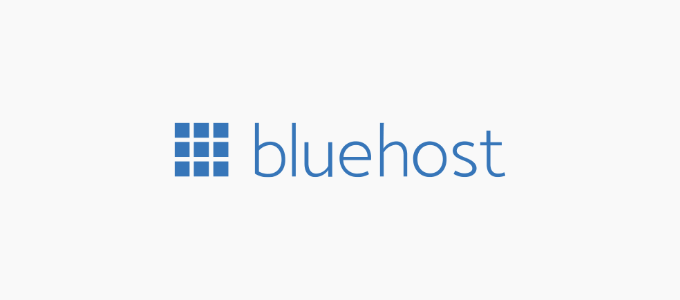
Bluehost is my top recommendation for anyone starting a new WordPress website. They make it incredibly easy to get online with their one-click WordPress installation and free domain name for the first year.
I’ve personally used Bluehost for several of my smaller projects, and it’s a great option for beginners. You can read about my experiences in my Bluehost review.
✅ Pros of Bluehost:
- You get a free domain name for the first year when you sign up for a hosting plan. This is a fantastic perk that saves you money and simplifies the setup process. I used this offer when I first launched my food blog, saving me around $10.
- Bluehost is officially recommended by WordPress.org, and their hosting environment is optimized for WordPress performance. Installing WordPress is as simple as clicking a button. I remember setting up my first WordPress site on Bluehost – it took less than five minutes!
- Their 24/7 customer support is readily available via phone, chat, and email. I’ve always found their support team to be helpful and responsive, even for relatively minor issues.
- Bluehost offers competitive pricing, especially for their basic shared hosting plans. It’s a budget-friendly option that’s perfect for new websites and blogs. I started with their cheapest plan and easily upgraded as my site grew.
❌ Cons of Bluehost:
- Like many hosting providers, Bluehost’s renewal prices are higher than their introductory rates. Be sure to factor this into your long-term budget.
- During the checkout process, Bluehost offers several add-on services. While some can be useful, others might not be necessary for your specific needs. I recommend carefully reviewing the options before adding them to your cart.
Why I chose Bluehost: I recommend Bluehost for its simplicity and affordability. It’s the perfect starting point for beginners who want to launch a WordPress website without any technical headaches. The free domain name and one-click WordPress installation make getting online a breeze. Plus, their excellent customer support is there to help you every step of the way.
Pricing: With my Bluehost coupon code, WPBeginner users can get a free domain name, a free SSL certificate, and a discount on web hosting, which is a perfect deal for anyone looking to make a new website.
Basically, you can get started for $1.99 per month and get a free new domain name. What a steal!
3. Hostinger
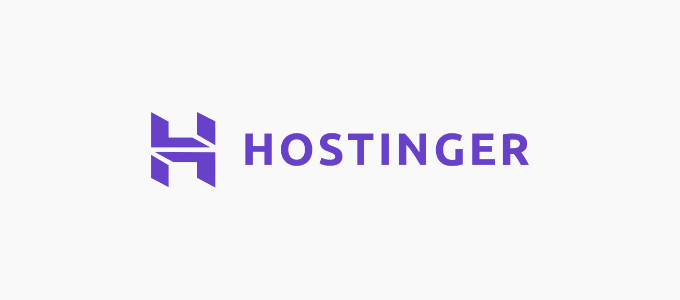
Hostinger is my go-to recommendation for users who want a budget-friendly hosting and domain registration package with free privacy protection. It’s a solid, cost-effective option, especially for international users, as they have data centers around the globe. I’ve personally used Hostinger for testing international versions of my websites, and I’ve been impressed with their performance.
In my detailed Hostinger review, you can learn how I have used Hostinger and found them to offer some of the fastest WordPress hosting and support.
✅ Pros of Hostinger:
- Hostinger includes free domain privacy with their hosting plans, which is a big plus for protecting your personal information. Many other registrars charge extra for this essential feature, so this is a significant cost saving.
- With data centers worldwide, Hostinger offers excellent performance and reliability for users around the globe. This was crucial for me when testing multilingual versions of my sites targeting different regions.
- Their hPanel control panel is clean, intuitive, and makes managing your domains and hosting a breeze. Even for beginners, navigating the interface is straightforward. I found it much easier to use than cPanel, which some other hosts use.
- You can use Hostinger to quickly create your website in just a few clicks by either using WordPress or their own website builder. I’ve found their site builder to be a great WordPress alternative for creating simple one-page sites or landing pages.
- Hostinger’s pricing is highly competitive, making it one of the most affordable options on the market. This is especially appealing for new users or those on a tight budget.
❌ Cons of Hostinger:
- While their support is generally good, some support options are limited on their lower-tier plans. If you anticipate needing extensive support, consider opting for one of their higher-tier plans.
- Similar to Bluehost, Hostinger also promotes various add-on services during checkout. Be mindful of what you actually need and avoid unnecessary extras.
Why I chose Hostinger: I recommend Hostinger for its value and international reach. The free domain privacy is a major selling point, and their global data centers ensure good performance regardless of your location. The easy-to-use interface and included website builder make it a great choice for beginners.
Pricing: Hostinger is offering WPBeginner users up to 78% off WordPress hosting, which includes a free domain, so you can get started for only $2.69/month. Don’t forget to use WPBeginner’s Hostinger coupon to access these exclusive savings.
4. Network Solutions
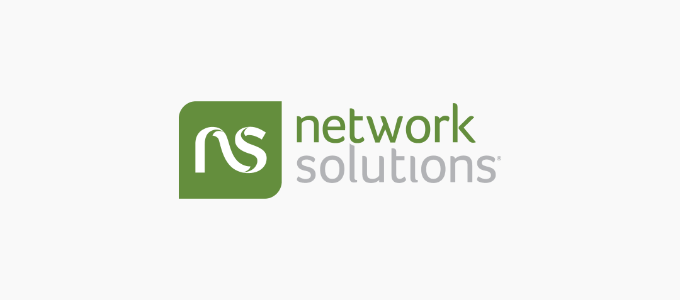
Network Solutions is one of the largest domain registrars out there, with over 7 million domains registered. This makes it a great option if you are looking for a niche TLD, although it also has many of the popular options like .com, .net, .org, .biz, .info, and more.
✅ Pros of Network Solutions:
- Since Network Solutions is one of the biggest domain registrars, their services include web hosting, a website builder, website security tools, a business email address, online marketing, SEO services, and even IT support. It’s like a one-stop shop for small businesses.
- Their platform comes with all the domain features that you’d expect, such as DNS management, private registration, WHOIS privacy, etc.
❌ Cons of Network Solutions:
- There are several complaints about slow response times from support, which can be frustrating if your website is suddenly down and you cannot resume your business operations.
- I’ve also found that its dashboard is not as user-friendly as Domain.com.
Why I chose Network Solutions: Despite some drawbacks, I appreciate Network Solutions for their comprehensive range of services. Basically, if you run a small business, they can be your one-stop shop for your online web presence.
Pricing: Network Solutions is offering my readers a 25% discount on domain names, so it only costs $7.49 for .com. You will need to use my link from their site and this Network Solutions coupon code: WPBEGINNER during the checkout.
Note: The promo coupon code is case-sensitive and all uppercase.
You can also get a free domain from Network Solutions when you purchase their WordPress hosting plans or other website / eCommerce hosting packages.
5. GoDaddy

GoDaddy is a great option if you are looking to buy an existing domain as they have a domain brokerage service. Plus, they offer domain registration for up to 10 years in advance, so this could be the way to go if you want to lock in your domain name over the long term.
GoDaddy is also one of the oldest and most popular domain registration companies, managing more than 84 million domain names for over 20 million customers.They offer a wide variety of popular domain name extensions to choose from.
✅ Pros of GoDaddy:
- Their pricing is one of the most competitive options I’ve seen on the market, and you may even get a significant discount on the first year of your domain registration.
- For professionals, GoDaddy offers a premium Domain club membership that has discounted domain pricing. This makes sense if you are registering or managing hundreds of domain names.
- GoDaddy has a powerful, easy-to-use domain management interface that allows you to transfer your domain name, change name servers, update contact information, and so on.
❌ Cons of GoDaddy:
- Unlike many entries on this list, an SSL certificate is not included by default.
- And similar to Hostinger, GoDaddy has a 60-day lock on domain transfers after registration.
Why I chose GoDaddy: I’ve included GoDaddy on my list because of its longstanding reputation and robust feature set. Their competitive pricing, especially for the first year, makes them an attractive option for many users.
Pricing: GoDaddy starts at $11.99/year, but pricing varies.
Related: See the best GoDaddy alternatives that are cheaper and more reliable.
6. Namecheap
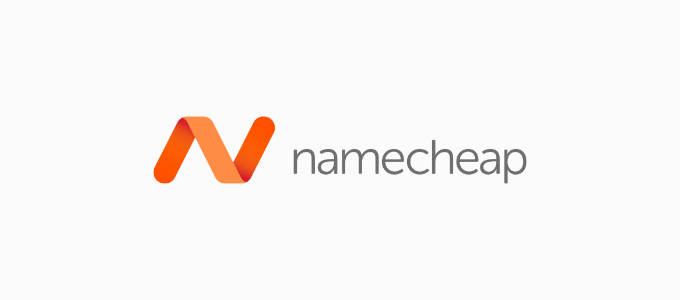
Namecheap comes with a built-in auction tool that allows you to bid on premium domains, so it’s a great choice if you have your eye on an existing domain. They also have one of the most powerful domain search tools that helps you find the right domain name and makes suggestions when your preferred choice is not available.
✅ Pros of Namecheap:
- One thing I like about Namecheap is that they offer free whois privacy with all their domain purchases.
- They also offer domain add-on services like domain privacy and premium DNS. Their domain management area is clean, but it’s not as user-friendly as GoDaddy’s new interface.
❌ Cons of Namecheap:
- I used to use Namecheap, but I ended up transferring a lot of my domains to other providers because I just had too many issues logging in to their domain management panel.
- Also, I’ve heard way too many complaints about their managed WordPress hosting plan because it doesn’t support popular plugins like AIOSEO. In my opinion, the platform isn’t ready for scale despite what their support tells you.
Why I chose Namecheap: Despite some personal challenges I’ve faced with their platform, I included Namecheap on this list because they offer excellent value for many users. Their free WHOIS privacy on all domain purchases is a standout feature that lots of people appreciate.
Pricing: Namecheap starts at $6.49/year.
7. DreamHost
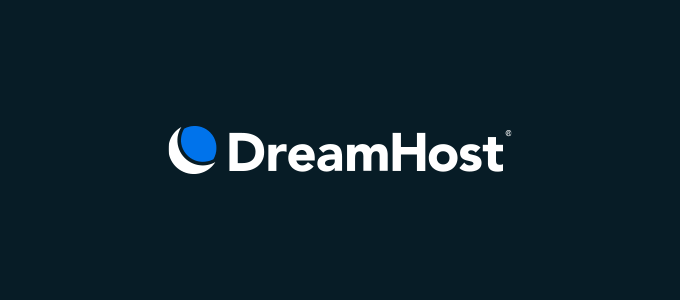
DreamHost is another popular web hosting service provider and domain name registrar. They are particularly appealing because they include free domain privacy protection with their hosting plans and domain registrations, along with other useful perks like subdomains and custom nameservers.
They are also offering WPBeginner readers a free domain name with domain privacy included for anyone signing up for their Shared Unlimited hosting plan.
✅ Pros of DreamHost:
- You can register a domain name without buying hosting through them for $8.99 per year, which also includes free private registration. That’s pretty great value.
- DreamHost also offers 400+ TLDs and comes with all the domain management tools that you can expect from a large domain provider like DreamHost.
- Aside from shared hosting, Dreamhost also offers managed WordPress hosting called DreamPress, which is great for larger websites.
❌ Cons of DreamHost:
- DreamHost has a 60-day lock on domain transfers after registration.
- Additionally, some users have reported delays in getting support.
Why I chose DreamHost: Overall, DreamHost offers a pretty good deal for domains, especially if you’re looking to buy one with a free private registration. Plus, there are a lot of TLDs to choose from.
Pricing: DreamHost starts at $2.59/month for hosting, and that includes a free domain name.
8. HostGator
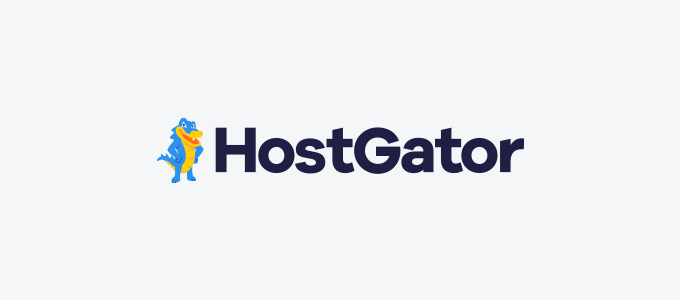
HostGator is a popular company that serves as a one-stop shop for domain names and shared website hosting. They stand out for offering a very easy and beginner-friendly domain registration process, alongside a nice selection of extensions, domain privacy, and simple DNS management tools.
✅ Pros of HostGator:
- HostGator has an easy-to-use domain search tool that helps you quickly find a suitable domain name for your business. Their domain management area is beginner-friendly and well-documented, which makes it easy to transfer domains if you need to.
- Aside from domain name and hosting, they have also introduced a brand new drag-and-drop website builder called Gator. They are offering a free domain name and hosting with all of their website builder plans.
❌ Cons of HostGator:
- In the early days of WPBeginner, I used HostGator as my web host. The site was on their VPS hosting plans until it got much larger, so I had to switch to SiteGround. That’s something to keep in mind before choosing HostGator.
Why I chose HostGator: Its user-friendly tools make domain registration and management a breeze, especially for beginners. While they may not suit rapidly-growing sites, as I learned with WPBeginner, HostGator is still an excellent choice for small to medium-sized websites.
Pricing: HostGator costs $1.99/month for WordPress hosting and you get a free domain name.
Bonus: BuyDomains (Premium Domains)
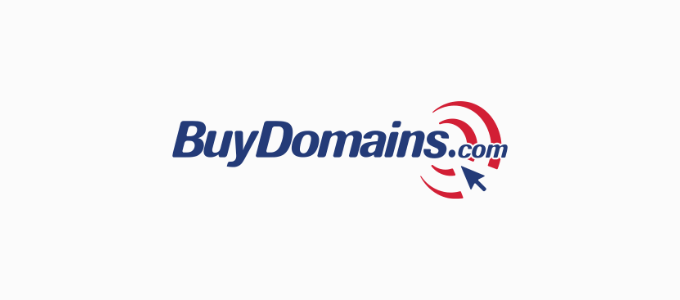
BuyDomains allows you to search for premium domain names matching your search terms. Premium domain names are domain names that are already registered but are available for sale from a third party.
These domains are often more memorable, shorter, and brandable, which is why they are more expensive. That said, I highly recommend them if you’re serious about starting an online business empire.
If you cannot find a suitable domain name and you have the budget, then you can use BuyDomains to search for a premium domain name.
What Is the Best Domain Registrar?
In my opinion, Domain.com is the best domain registrar on the market for small and large businesses. They offer the most reasonable pricing and have all the features.
If you are looking to build a website, then you can get a free domain name from both Bluehost and Hostinger when you sign up for their web hosting.
They are among the best web hosting companies on the planet, and they also offer step-by-step website setups for any type of website, including real estate, small business sites, online stores, and more.
Disclaimer: To help readers avoid choice paralysis, I only compared the best domain registrars, in my opinion. This list doesn’t include other domain registrars like Namesilo, Porkbun, Donuts, Name.com, Dynadot, Google Domains, Hover, Shopify, WordPress.com, Enom, Tucows, Netim, IONOS (formerly 1&1), Wix, Squarespace, etc., because I believe the solutions mentioned in this article are simply better.
Frequently Asked Questions About Domain Name Registrars
I’ve helped millions of users pick the right domain registrar, so I’ve heard just about every question imaginable. Here are the most common questions I get:
Does it matter which domain registrar I use?
Yes, absolutely. Different registrars offer different features, pricing, and support levels. A reliable registrar with a good reputation is crucial for your website’s stability and security. A poor choice can lead to issues with DNS, affecting your site’s availability, and make domain management a nightmare.
This is why I recommend using Domain.com, Bluehost, or Hostinger. They all have reliable infrastructure and security.
Which is the cheapest domain registrar?
When it comes to price, nothing beats free. So, the cheapest domain registrar is Bluehost or Hostinger, since they both offer you a free domain name with web hosting.
With that said, WPBeginner readers can use my Domain.com coupon code to get additional savings on Domain.com, which makes the prices very attractive.
What is a reasonable price for a domain name?
Most domains cost between $9 and $15 per year. Prices vary based on the extension (.com, .org, etc.) and any add-on services like privacy protection. Remember to factor in renewal costs, as introductory offers often expire after the first year.
I have a detailed guide discussing the costs of a domain name and how to evaluate premium domain value.
Can I buy a domain name forever (permanently)?
Not usually. Domain registrations are typically renewed annually.
Think of it like a subscription. While you can pre-pay for several years at a time, permanent ownership isn’t generally an option with most registrars.
However, some newer services like Unstoppable Domains offer longer-term or even permanent registration options, but these often involve newer technologies like blockchain and may have limitations.
Why is domain renewal more expensive?
Many registrars offer steep discounts for the first year to attract new customers. Renewal prices reflect the regular, non-discounted rate. Pre-paying for multiple years during the initial registration can often help you lock in those lower prices for longer.
Who is the safest domain registrar?
All registrars accredited by ICANN are generally safe. However, prioritize registrars with strong security measures like two-factor authentication and domain locking. Bluehost and GoDaddy are known for their robust security practices.
Can someone steal my domain name?
Unfortunately, yes. Domain theft, or hijacking, is a real threat. Protect yourself by using strong passwords, enabling two-factor authentication, and keeping your contact information up-to-date with your registrar. Consider using an identity theft protection service for added security.
Can I use multiple domain registrars?
Absolutely. Many people use multiple domain registrars for various reasons, like taking advantage of specific deals or managing domains for different clients. Just be aware that transferring domains between registrars can take several days.
Who determines if a domain is a premium domain?
The price of a premium domain is usually set by the current owner or, in some cases, by the domain registry itself if they’re holding back certain desirable names. These domains are often shorter, more memorable, or highly relevant to specific industries, making them more valuable.
For example, I acquired a two-letter am.co domain for my management company Awesome Motive, and this was a premium domain.
Which are the top 3 best domain registrars, in your opinion?
To recap, my top 3 choices for the best domain name registrars are:
- Domain.com – Best domain registrar overall. Bonus: Also offering special pricing for WPBeginner readers.
- Bluehost – Best domain registrar if you are looking for web hosting. Bonus: Domain name is free.
- Hostinger – Best domain registrar with a free domain and cheap web hosting.
No, this last question is not a joke. I seriously get this question even after referring people to this guide.
I hope this article helped you learn how to choose the best domain registrar for your business. You may also want to see my guide on how to get a free business email address and how to get a free business phone number for your website.
If you liked this article, then please subscribe to our YouTube Channel for WordPress video tutorials. You can also find us on Twitter and Facebook.





mtoolshub
Great guide! Clear, concise, and super helpful for choosing the right domain registrar. Thanks for making the process so much easier
WPBeginner Support
You’re welcome, glad to hear our list was helpful!
Admin
Oyatogun Oluwaseun Samuel
I would say this is a highly opinionated arena, for me I consider a registrar that gives grace period for renewal with the most important of service reliability and great customer support as the best registrar. This is because i have some clients who are often late in the renewal of their domain name and such a registrar with grace period is highly desired.
THANKGOD JONATHAN
considering reputation and support team experience is also important when selecting your domain registrar.
when you choose the wrong company you may face challenges renewing your domain as some companies have little to zero customer tolerance. all they needed was your money.
Jiří Vaněk
Therefore, there is a simple test. Every proper registrar should have contact information. Email or phone. There is nothing better than writing or calling them to test how quickly their support will respond even when you are not yet their customer and not generating revenue for them. If they respond quickly and willingly, there is a high probability that they will behave the same in the future.
Uzair
I’d say Reputation and Reliability stand out as the most critical factor when choosing a domain registrar as mentioned in this article. The registrar’s track record and reliability can significantly impact the website’s accessibility and security, making it a fundamental consideration in the selection process.
Dayo Olobayo
Couldn’t have said it better! Reputation and reliability are crucial. Along with those, consider the registrar’s customer support. What happens if you have an issue with your domain… will they be there to help quickly and efficiently? Look for registrars with excellent customer service ratings.